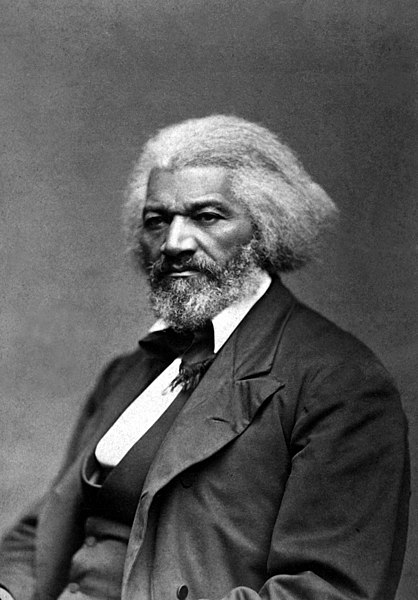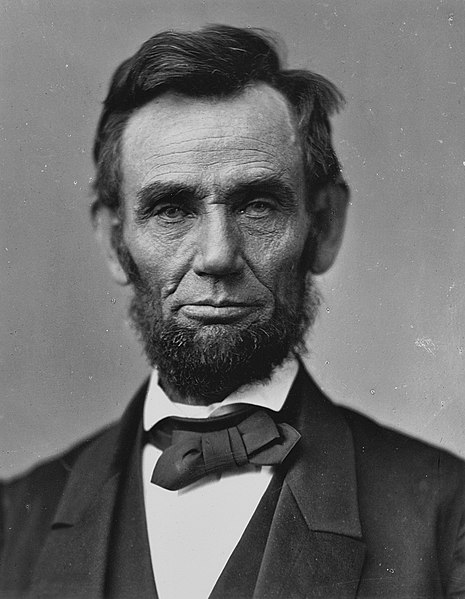The former prairie-lawyer and then-president and the ex-slave and outspoken abolitionist formed an unusual friendship.
-
Winter 2009
Volume58Issue6

At dusk in early April 1866, a large crowd filed into Representatives Hall of the imposing Illinois Capitol in Springfield. Just 11 months earlier, President Lincoln’s rapidly blackening body had lain here in state as thousands of townspeople had filed past to say goodbye.
Now many of the same people gathered to hear a lecture entitled “The Assassination and Its Consequences,” delivered by the country’s foremost abolitionist, Frederick Douglass. For several months, the powerful black orator had given the same speech across the nation, but this venue, more than any other, lent extraordinary gravity to his words. In the great room Lincoln had accepted the 1858 Republican Senate nomination and delivered his controversial “House Divided” speech. Though the obscure Illinois lawyer would lose that contest to his longtime rival Stephen A. Douglas, he found himself unexpectedly propelled to the presidency. Lincoln had also argued in front of the Illinois Supreme Court more than 200 times in this building.
Standing on the podium, Douglass immediately commanded attention with his splendid mane of graying hair swept back from his broad forehead, his blazing brown eyes, deep regal voice, and overwhelming physical presence. “Prior to the Civil War,” he began, “there was apparently no danger menacing our country, but a few farseeing men foresaw the calamities that have come upon us, and their warnings were treated as idle talk . . . The few listen and the many pass on, unheeding the precipice over which they are being hurled."
The slave child Frederick Bailey, born in 1818, had gradually transformed himself into the master orator Frederick Douglass, internationally known by the 1840s through the force of his eloquence fused to a compelling dignity. Only fellow abolitionist Wendell Phillips equaled him as a speaker. No one on the national stage could match the powerful, redemptive quality of his life story, which was compelling for more than his daring escape from slavery on Maryland’s Eastern Shore. With dogged perseverance, he had toured for years from town to town, often at the risk of his life, to evoke the horrors of human bondage. He had written a best-selling personal testimony about his struggle for freedom, edited the nation’s most notable black newspaper, and finally, through his forceful recruitment of black soldiers, he had become the principal voice of his people.
The intent of Douglass’s talk in Springfield was not to dwell on that past, but to confront the new realities facing a victorious North and a nation without Lincoln. “The danger impending over us is the cold, cruel wanton surrender and betrayal of our friends and allies,” cried Douglass. There were the thousands of slaves who had streamed into Union lines as “contraband.” Many other black men and women had supported the war effort by picking crops, feeding the troops, and providing valuable information. Most of all, Douglass pointed to the contribution of the 180,000 black soldiers who were finally granted the right to carry a musket. One Union soldier in ten had been black. Lincoln had rightly noted that it had been this tenth that provided the margin for Union victory.
Though he did not admit it that night, Douglass had spent the last four years engaged in a long and public contest with a president who was not only slow to emancipate slaves and reluctant to put black soldiers into combat, but had made no firm commitment to give the vote to the black man, except perhaps for “those who had served in battle or of exceptional intelligence.” This night Douglass set aside all their struggles.
When it counted, Lincoln had effectively collaborated with Douglass’s decades-long pursuit of the total and irrevocable destruction of slavery. That an outspoken black abolitionist and a cautious prairie lawyer would ever meet, much less profoundly influence one another and form a partnership, is astounding. It was largely the brute extremities of war that had drawn them together in what Douglass in 1862 called “characters of blood and fire.” Even with their deep disagreements, they had forged a strong bond of mutual understanding and respect. As a result, Douglass’s personal mission to liberate black Americans became inescapably bound up in Lincoln’s life—and death.
The president had made clear for three years that saving the Union was his overarching goal, and from the first shot at Fort Sumter on, Douglass had been equally clear that this was not enough. The hope of reunion with the South, he argued, was doomed unless the higher mission of eradicating slavery was brought to the fore. “What business, then, have we to be pouring out our treasure and shedding our best blood like water for that worn-out, dead and buried Union, which had already become a calamity and a curse?” This direct challenge to Lincoln was only part of a larger story of the dispute between these formidable men over the meaning of the war and, thus, the truth of America.

The epic emancipations of four million slaves remains one of the greatest stories in world history, a truth largely unrecognized by Americans because we have failed to register the essential role of African Americans in the Civil War, and because of the muted, almost amnesiac manner in which the story has been told of the failure of Reconstruction. In this story, Douglass is a national her, an indomitable fighter who faced down nearly impossible odds. Writing three autobiographies set him up well to step into an ennobling heroic part, for he understood that his life had always been the story of his people advancing to redemption. He knew that his personal odyssey from oppressed insignificance to world standing vindicated the struggle of black people and challenged a nation that refused to offer manhood, equality, and even the right to vote to so many of their fellows.
The first conversation between Douglass and Lincoln on August 10, 1863, remains one of the pivotal moments in American history: when a former slave could enter the office of the president to discuss significant issues and festering problems and, more remarkable still, when the president could seem to enjoy Douglass’s opinions and views, no matter how contrary to his own. And Douglass freely recalled, “Lincoln is the first white man I ever spent an hour with who did not remind me I was a Negro.”
Yet these admirable sentiments do not come close to encompassing the true nature of their conflict, as when after the new president’s first inauguration Douglass contemptuously noted, “What an excellent slave hound he is.” Or as he wrote in 1862, “Mr. Lincoln assumes the language and arguments of an itinerant Colonization lecturer, showing all the inconsistencies, his pride of race and blood, his contempt for Negroes and his canting hypocrisy.” Douglass wrote in a letter to the editor Theodore Tilton, just after his second White House meeting in 1864, that “when there was any shadow of a hope that a man of a more decided anti-slavery conviction and policy could be elected, I was not for Mr. Lincoln.”
Lincoln possessed an ability to absorb criticism and rise above political abuse that beggars imagination today. Douglass himself certainly came to understand that this measured politician had indeed been the essential man in this national crisis, perhaps the only leader who could have both preserved the Union and won emancipation. Douglass saw Lincoln in all his imperfections and perceived his “slowness” in responding to the black cry for freedom, yet stated in the dedication of the Freedmen’s Memorial monument to Lincoln in 1876 that blacks were correct to love him: “We came to the conclusion that the hour and the man of our redemption had somehow met in the person of Abraham Lincoln.” Lincoln bonded to one of his severest critics because he sensed that they shared common ground, as was evident in the Gettysburg Address, where for all time he calmly and simply evoked the vision of America’s “new birth of freedom.”
Lincoln and Douglass alike understood that the fate of this special destiny was irrevocably bound to the “peculiar institution.” The war was nothing less than an agonizing rebirth that would either ratify or nullify this destiny. Neither victory for the North nor the abolition of slavery was ever foreordained. Any compromise before the guns of Fort Sumter would have left those four million slaves under the burden and the lash. If the First Battle of Bull Run had gone the North’s way, then the general vision of a quick resolution of the war would have left slavery in place.
If McClellan had possessed the courage to drive home the Peninsula Campaign in 1862 or risked his men to destroy Robert E. Lee’s forces at Antietam, the South might have collapsed before Lincoln signed the Emancipation Proclamation on September 22, 1862. Then McClellan, a man who had publicly expressed his desire that slavery continue undisturbed, would have wielded great power.
If Lee had not possessed the headstrong will to order Pickett’s charge but instead had maneuvered his army toward Harrisburg and Philadelphia, then Europe might well have decisively moved into the conflict and stymied any further prosecution of the war by the Lincoln administration. Had Atlanta not fallen when it did, Lincoln would likely have lost the 1864 election to McClellan, effectively leaving slavery alive.
Douglass understood how close his cause came to failure. Abolitionism was largely upheld by people for whom slavery was an abstraction. The price of saving the Union seemed at several points to be nothing short of the sacrifice of his people. Above all, he understood that Lincoln was fighting a different war than he was. There were many plausible paths to victory for Lincoln that could have meant disaster for Douglass’s mission.
Douglass viewed the war not just through the lens of Union army victories in battle, but through the emerging sense of Lincoln and the Union that the Confederacy and the “peculiar institution” of slavery must be fully defeated at one and the same time. This realization dawned slowly among Northerners and, even by the last year of the war, was never assured. Douglass emerged as a figure second only to Lincoln because he spoke the truth, spoke it to powerful figures who did not wish to hear it, accurately predicted the path the war would take, and offered everything he had, including the lives of his children, to gain freedom for others.
Lincoln’s mission was to save the Union, while Douglass’s mission was different and two-pronged: emancipation through this conflict, and then established equality. The latter quest speaks with particular power and relevance over the years. At the heart of Douglass’s message was the belief that the nation must confront the interconnectedness of black and white. Many, including Lincoln, had tried to evade this reality.
Douglass understood that the Union itself would not survive without the monumental contributions of African Americans, though their rightful place would not be secured until white Americans respected their rights and allowed them their due share of opportunities within the country as a whole. Douglass prophesied that for the nation to be redeemed, we would need each other, then and now. Lincoln needed black soldiers to win his war; Douglass needed Lincoln to win his people’s freedom; and they needed each other to move the nation forward. Their relationship, their struggle, tells us much about ourselves as a people and why the failure to fully achieve Douglass’ vision of equality means that our Civil War is not yet over.
Adapted with permission from Douglass and Lincoln by Paul and Stephen Kendrick. Copyright © 2008. Reprinted by arrangement with Walker & Co.

